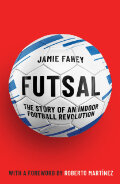Ricardinho’s legacy: the magician, the rebel game – and that goal
After 187 caps, 141 goals and a record six world player of the year accolades, Ricardinho has retired from international futsal. The announcement came just weeks after O Mágico inspired Portugal to a historic World Cup title. Aged 36, the Portuguese legend has now won it all (including his very own copy of Futsal: The Story of an Indoor Football Revolution) and will continue playing for ACCS in Paris
To mark O Mágico’s decision, here’s an exclusive extract from the book, which uncovers the secrets – in his own words – of the seleção star’s remarkable career
EXCLUSIVE extract: Chapter 13, Portugal: The Rebel Game
IN MANY ways, Ricardinho’s journey mirrors the sport’s rise.
Since the day he was plucked from obscurity by Carolina Silva at the dawn of the new millennium, futsal has been transformed from a neglected, impoverished, largely amateur pastime to one gaining greater recognition for its links with developing football skills, and as a professional sport in its own right.
Whether it makes the Olympics any time soon or not, Ricardinho’s legacy in the game is secure. Though the biggest personal brand in a sport embracing the digital age, Ricardinho’s passion, dedication and approachability seem to reflect a more traditional bygone era.
On court, he’s a cartoonish figure of squat, pent-up power and finesse, the inveterate street hustler as hypnotically dominant with a futsal ball as he was once mesmeric with a tiny bundle of socks and tape.
It’s a vision of what the eleven-a-side game used to resemble before the greed, the cynicism and the agents seized its soul. The football of the Wayne Rooney breakthrough years, a raw and refreshing energy of the street urchin gatecrashing the big league.
The football of the Ronaldo O Fenômeno decade from the mid-90s onwards, scaring and scarring defences in equal measure with the ball at his feet.
Futsal seems somehow closer to this renegade spirit, a little freer, more pure, less predictable, than the 2020 iteration of association football – despite Lionel Messi and Cristiano Ronaldo’s valiant efforts. Futsal is the rebel game.
Video: Ricardinho speaking in 2019 about his most famous goal, the outstanding strike against Serbia
Off court, the ball of energy dressed in a black, green and red FPF seleçao tracksuit does not relent. There’s a breathless verve about Ricardinho.
It’s clear, he can talk the talk too. Just before the end of the interview, there’s time to hand him a smartphone so he can describe arguably his greatest moment. Before I’ve finished explaining, his furrowed brow gives way to a cheeky smile, his eyes widening as he nods knowingly. He knows where I’m going. He’s just as quick to scroll the footage forward.
‘It’s the right foot,’ he declares, pointing at the screen.
‘Look at the right foot.’ He’s talking about the seasoned international Marko Pršić, his hapless Serbian opponent in a feisty group game at the 2016 Euros in Belgrade.
The Ricardinho standing here hits pause on the action at the point where the advancing Pršić offers up his right leg.
The Ricardinho on the screen also halts, poised, left sole glued to the ball, right foot planted on the jet-black court, having feigned twice to explode towards goal, where three Serbian players are perched zonally, waiting, watching, fearing the worst: ‘In this moment I saw him attack the ball with his right foot. By doing this, his body moves this way.’
Video: Ricardinho, speaking in 2019, reacts to being compared to Lionel Messi and Cristiano Ronaldo
It was the moment of truth. The time to hit the multi-button combination play he’d practised so often. One the Portuguese no. 10 knew could instantly destabilise his marker and trigger a brazen act of explosive dexterity, flicking the ball up and over Pršić’s head to leave the dazed Serbian flailing to the ground as he chests the ball, lets it bounce and smashes it high into the Serbian net. ‘I knew it would happen... I’ve imagined all that,’ he beams.
The skill, he says, was inspired by the footwork of Issy ‘Hitman’ Hamdouai, a freestyler and briefly Ricardinho’s team-mate at Inter Movistar in 2014. O Mágico delivered a glossier, more ruthless update on the training session Akka 3000, as it is known.
“It’s his right foot. In this moment I saw him attack the ball with his right foot”
His 2.0 version, complete with added potency and game realism, amounts to an act of breathtaking sporting audacity. A glorious moment of mathematical symmetry – four touches to dupe four opponents in four seconds from start to sensational finish – that typifies his unique talent. And one that brings to mind the exhortation by Jorge Braz at St George’s Park to seize on the micro-details in one-versus-one encounters.
‘It’s not hard to do that dribble,’ insists Ricardinho. ‘The difficulty,’ he continues, ‘lies in finding the right moment in a match where you’re under pressure from the 10,000 people watching. I know players way more skilful than me who know a lot more tricks – but under that pressure it’s much more complicated.’
“It’s not hard to do that dribble. The difficulty is finding the right moment under pressure from 10,000 people watching”
At club level, Ricardinho’s finest four seconds came with three minutes remaining in the fifth and decisive playoff for Inter Movistar against Barcelona, at the climax of the 2016–17 LNFS season. The victim – his fierce rival Ferrão – is beaten by a high-risk caneta on the wing with the scores level.
Ricardinho skips away, then fires an unstoppable toe-poke finish past the Barca keeper – securing yet another title for Inter and confirming his own place in the pantheon of futsal’s greatest ever game-changers.
Ricardinho hands the phone back. The FPF press officer, Bruno, says we have a few minutes left before he must return to the squad to prepare for the second Brazil match – so, naturally, we get a ball out.
Extract from Futsal: The Story of an Indoor Football Revolution
Have something to share? Add your comment below.










ENGLAND MEN’S futsal team is back. To mark the historic return, here’s an exclusive extract from Futsal: The Indoor Game Revolutionizing World Soccer focusing on the last time they competed in main round qualifiers